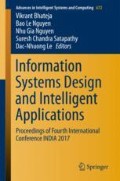Abstract
A typical classification problem pertaining to DSS can be solved by employing any classification algorithm such as Bayesian classifiers, neural network, decision tree. But, existing single classifier-based predictive modeling has limited scope to provide a generalized solution for different learning contexts. In this paper, an ensemble-based classification approach using voting methodology is proposed for the decision support system. The proposed ensemble-based system combines three heterogeneous classifiers, namely decision tree, K-nearest neighbor, and aggregating one-dependence estimator classifiers using product of probability voting rule. This paper presents a comparative study of the proposed voting algorithm with the other well-known classifiers for 15 standard benchmark datasets and proved that the proposed method achieves better accuracy for most of the datasets.
Access this chapter
Tax calculation will be finalised at checkout
Purchases are for personal use only
References
Turban, E. Decision support and expert systems: Management Support Systems. Englewood Cliffs, N.J., Prentice Hall (1995).
Quinlan J.R. C4. 5: Programs for machine learning. Morgan Kaufmann, San Francisco, CA, USA (1993).
Webb, G. I., Boughton, J. R., & Wang, Z. Not so naive Bayes: aggregating one-dependence estimators. Machine learning, 58(1), 5–24.
Kwon, O. A new ensemble method for gold mining problems: Predicting technology transfer. Electronic Commerce Research and Applications, 11(2), (2012). 117–128.
Wan, Shaohua, Yang., H. Comparison among Methods of Ensemble Learning. International Symposium on Biometrics and Security Technologies (2013).
Mendes-Moreira, J., Soares, C., Jorge, A. M., & Sousa, J. F. D. Ensemble approaches for regression: A survey. ACM Computing Surveys (CSUR), (2012), 45(1), 10.
Witten, I. H., Eibe Frank, and Mark A. Hall Ensemble Learning. Data Mining Practical Machine Learning Tools and Techniques (2011).
Liu, Y., Yao, X. & Higuchi, T. Evolutionary ensembles with negative correlation learning. Evolutionary Computation, IEEE Transactions on, 4(4), (2000), 380–387.
Breiman, L. Random forests. Machine. Learning. 45(1), (2001) 5–32.
Rodriguez, J.J., Kuncheva, L., Alonso, C.J., Rotation forest: A new classifier ensemble method. IEEE transactions on pattern analysis and machine intelligence (2006), 1619–30.
Dietterich, T. G. Machine-learning research. AI magazine, 18(4), (1997).
Witten, I. H., & Frank, E. Data Mining: Practical machine learning tools and techniques. Morgan Kaufmann, ed.2. (2005).
Bishop, C. M. Pattern recognition and machine learning. Springer, (2006).
Kumar, G., & Kumar, K.. The use of artificial-intelligence-based ensembles for intrusion detection: a review. Applied Computational Intelligence and Soft Computing, (2012) 21.
Marsland, S. Machine Learning: An Algorithmic Perspective, (2009), CRC Press.
Alpaydin, E. Introduction to machine learning. MIT press, (2014).
Rooney, N., Patterson, D., Anand, S., & Tsymbal, A. Dynamic integration of regression models. In Multiple Classifier Systems (2004). Lecture Notes in Computer Science, vol. 3077. 164–173. Springer Berlin Heidelberg.
Bashir, S., Qamar, U., & Javed, M. Y. An ensemble based decision support framework for intelligent heart disease diagnosis. In Information Society (i-Society), International Conference on (2014, November) 259–264. IEEE.
Salih, A. S. M., & Abraham, A. Novel Ensemble Decision Support and Health Care Monitoring System. Journal of Network and Innovative Computing, 2(2014), 041–051.
Gandhi, I., & Pandey, M. Hybrid Ensemble of classifiers using voting. In Green Computing and Internet of Things (ICGCIoT) (2015). 399–404. IEEE.
Livieris, I. E.,. Mikropoulos T. A., Panagiotis. A decision support system for predicting students’ performance. Themes in Science and Technology Education. vol 9, (2016) 43–47.
Kotsiantis, S. B. Use of machine learning techniques for educational proposes: a decision support system for forecasting students’ grades. Artificial Intelligence Review, 37(4), (2012) 331–344.
Luan, J. Data Mining Applications in Higher Education. A chapter in the upcoming New Directions for Institutional Research (2001), 1st Ed., Josse-Bass, San Francisco.
Nguyen Thi Ngoc Hien and Haddawy, Peter. A Decision Support System for Evaluating International Student Applications. In 37th ASEE/IEEE Frontiers in Education Conference, IEEE, (2007).
Kotsiantis, S. B., & Pintelas, P. E. A hybrid decision support tool-using ensemble of classifiers (2004).
M. Hall, E. Frank, G. Holmes, B. Pfahringer, P. Reutemann, Ian H. Witten. The WEKA Data Mining Software: An Update; SIGKDD Explorations, Volume 11, Issue 1, 2009.
Author information
Authors and Affiliations
Corresponding author
Editor information
Editors and Affiliations
Rights and permissions
Copyright information
© 2018 Springer Nature Singapore Pte Ltd.
About this paper
Cite this paper
Pandey, M. (2018). An Ensemble-Based Approach for the Development of DSS. In: Bhateja, V., Nguyen, B., Nguyen, N., Satapathy, S., Le, DN. (eds) Information Systems Design and Intelligent Applications. Advances in Intelligent Systems and Computing, vol 672. Springer, Singapore. https://doi.org/10.1007/978-981-10-7512-4_39
Download citation
DOI: https://doi.org/10.1007/978-981-10-7512-4_39
Published:
Publisher Name: Springer, Singapore
Print ISBN: 978-981-10-7511-7
Online ISBN: 978-981-10-7512-4
eBook Packages: EngineeringEngineering (R0)

